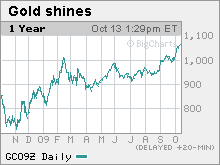Gold rally loses steam
After surging to a new trading high above $1,070 an ounce, prices end lower as the Federal Reserve says inflation will decrease.
NEW YORK (CNNMoney.com) -- Gold closed slightly lower Wednesday, after surging above $1,070 an ounce, as investors positioned themselves just prior to the release of the Federal Reserve meeting minutes.
December gold fell $2 to settle at $1,064.00 an ounce, after trading above $1,070.00 an ounce earlier in the session. Prices rose overnight to an all-time trading trading high of $1,072.00 an ounce.
"After the market made the move to a new high overnight, we saw a slight pullback as traders booked profits ahead of the FOMC," Adam Klopfenstein, senior market strategist at commodities brokerage firm Lind-Waldock, said before the minutes were released.
Gold, which has gained more than 20% this year, has been supported by worries that government efforts to stimulate the economy could set the stage for inflation as the economy recovers.
However, minutes from the September meeting of Federal Reserve's Open Market Committee indicated that the central bank expects inflation to decrease over the next few years.
"With the significant underutilization of resources expected to persist through 2011, the staff forecast core inflation to slow somewhat further over the next two years from the pace of the first half of 2009," according to the minutes.
At the same time, gold prices have been boosted by the weak U.S. dollar, which fell to a 14-month low Wednesday on speculation that U.S. interest rates will remain low for a longer-than-anticipated period of time.
The dollar index, which gauges the greenback's value against a basket of rival currencies, slid to 75.45, marking its lowest level since August 2008.
The weak dollar also boosted oil prices, which rose above $75 a barrel for the first time this year.
A softer greenback makes commodities that are priced in dollars, such as gold and oil, cheaper for investors using other currencies.
Investors will get more inflation data Thursday, when the government releases its September Consumer Price Index.
The closely watched inflation gauge is expected to show an increase of 0.2% in September, compared to a 0.4% rate the month before, according to a consensus of economists surveyed by Briefing.com.
Consumer prices excluding volatile food and energy costs, the so-called core CPI, are expected to have risen 0.1%, the same rate of increase as in August. ![]()


